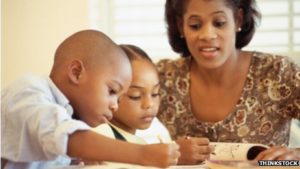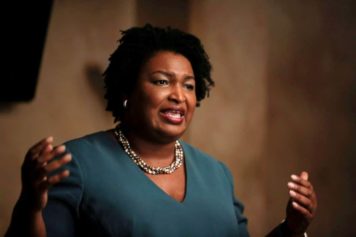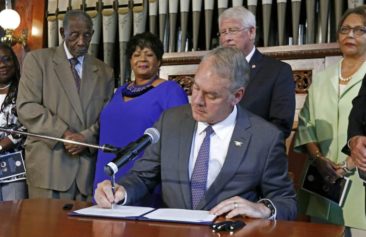The Kirksey family lives in a quiet suburb of Detroit. During a typical night at home, 7-year-old Brandon sprawls on the floor. He is seated near a wall filled with puzzles, textbooks and children’s books with multicultural themes. On this particular night, Brandon is studying a laminated map of the world.
Brandon recognizes the state of Michigan on the map and points to it proudly. His brother, 3-year-old Zachary, tries to repeat the word “Michigan” after hearing Brandon say it. Their mother Camille, who is looking on, corrects Zachary on his pronunciation.
While this may seem like a relaxing Sunday afternoon at home before the family starts adhering to their work and school schedules again, it’s actually a weekday for the Kirksey household. Brandon is actually being home-schooled.
Brandon’s younger siblings, Zachary and 10-month-old Ariyah, are also in the “classroom” and are likely picking up many of the things their older brother is learning.
Camille Kirksey has been home-schooling her kids for three years now. The Kirksey family is part of the increasing number of African-American families who are turning to home school in place of traditional education.
Home schooling is one of the fastest growing methods of academic instruction. In fact, the number of children being home-schooled and the number of children in charter schools is very similar. Around 2 million children are enrolled in charter schools, and the same is true for those who are learning at home.
Research also indicates that Black families home-school for reasons that are different from those of white families. In many cases, the way African-American children are treated in traditional school — by both teachers and students — is the determining factor for families who choose home school. The Kirksey family can certainly relate to this.
Every morning at home school, the Kirkseys have a yoga session in the back room of their home. They then move into the living room to read the stacks of books on the table. Later, it’s time for poetry citation, then math and reading. Fridays are field trip days, but sometimes the day is reserved for science experiments.
Kirksey admitted that until a few years ago, she never even considered home schooling. She said she’d “never seen anybody, especially black people, home-schooling.”
When she initially entertained the idea of teaching at home, Brandon, her oldest, was in a private pre-K program. The program had mostly Black students, she said, but most of the teachers were White. She said that didn’t bother her too much — until she noticed that some children, in particular the boys, were being treated differently. She said the teachers were “harsh” with the boys, and would “bark at them” and “order them around.” Brandon even says his teacher “didn’t really treat anybody nicely.”
Kirksey further explained that the treatment of Black boys at the school matches the unfortunate pattern in education, where African-American children are not treated with the patience and kindness they need in the classroom. She decided she didn’t want her children to endure such harsh conditions while trying to get an education.
Kirksey then saw a Facebook post profiling an African-American, home-schooling family who lived in Colorado. She convinced her husband that home schooling was a great idea then quit her job (where she’d been for a decade) and became her children’s teacher.
Kirksey is excited that she gets to teach her kids a version of history that features African people. She feels it is important for them to know that Black people are an integral part of history, and that African history isn’t limited to slavery. She recently started a unit on African kingdoms as part of Brandon’s lesson plan.
She’s also excited about the fact that education involves the whole community now that she’s home schooling. African culture counts the community as extended family. It is quite common for older members of the community to teach the younger ones a skill or trade. There are also co-ops for other home school families, most of whom are African-American.
While the cultural awareness that comes from home-schooling is certainly liberating, Kirksey said her decision to home-school was based on more than just race. She said home-schooling allows her family to spend more time together, and the kids can freely explore the things that interest them.
About 220,000 African-American families are now home-schooling in the United States, according to Ama Mazama, a Temple University professor. Mazama said the numbers were much lower a few years ago. Black families who choose home schooling are mostly urban, two-parent households. The parents of home-schooled children are often well-educated and in the upper or upper-middle class, she said.
Mazama said white families choose to home school their children mostly for religious reasons. However, Black families home school primarily because of racism in the school system.
It’s no secret that African-Americans have been fighting for generations to get access to quality education. These days, many Black parents realize that they can do a better job than traditional schools when it comes to giving their children a balanced and worthwhile educational experience.



